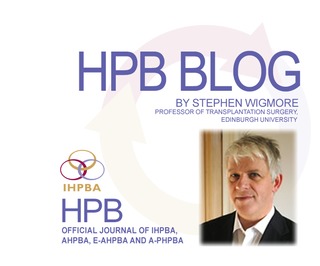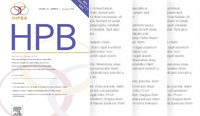International Hepato-Pancreato-Biliary Association
HPB Blog, June 2017

Advancement of standards of perioperative care are often accompanied by attempts by surgeons to push the envelope of surgical possibility to offer surgery to more patients. HPB surgery is no exception however it is always good to examine the evidence of outcomes which might support novel procedures or expansion of surgery into populations that have not previously had much access.
In the June Edition of HPB we see a few papers exploring this theme. A systematic review and meta-analysis from Jegatheeswaran and colleagues from Manchester, UK, looks at the evidence supporting superior mesenteric artery resection for pancreatic cancer as part of pancreatoduodenectomy but found poor outcomes with high morbidity and mortality and concluded that this procedure could not be recommended based on evidence.
Kim and colleagues from Victoria, Australia explored the evidence supporting pancreatoduodenectomy in the over 80 year old population again though a systematic review and meta-analysis. While they found some good outcomes morbidity was increased by 50% and mortality doubled in this population compared with younger patients. They advocate careful discussion with patients about the risks and benefits of surgery. The benefit of repeat liver resection for patients with colorectal liver metastases was the subject of a systematic review by Wurster and colleagues form Heidelberg Germany. They found equivalent outcomes in terms of perioperative complications between first time and repeat resection patients and call for a registry to monitor long term outcomes.
The subject of pancreatic fistula is a frequent topic for HPB surgeons and this edition of the journal features two articles. One, a collaborative effort from Philadelphia and Verona, questioned surgeon perception of pancreatic fistula risk. This study demonstrated both wide variation in practice and technique but also perception of risk. Perception of risk was best at the extremes of scenarios and worst between low and moderate risk assessment. Grendar and colleagues in a number of US HPB centres undertook a study to evaluate the fistula risk score (FRS) in patients undergoing pancreatoduodenectomy. They found that the FRS stood up well across their diverse practices and was able to stratify patients reliably into risk categories.
Obtaining a tissue diagnosis in patients with proximal or ‘high’ biliary strictures is often quite difficult but can be useful to guide palliative chemotherapy or to direct surgery. Mohkam and colleagues form Birmingham present a nonrandomized comparative study looking at the diagnostic performance of endoscopic ultrasound guided biopsy and fine needle aspiration compared with percutaneous transhepatic endobiliary biopsy forceps. They found similar diagnostic accuracy and performance and recommend the use of endobiliary biopsy as the method of choice in patients where percutaneous biliary drainage is planned at the same procedure. Staying with the biliary system, Lidsky and colleagues from Durham North Carolina report the consequences of being unable to control the cystic duct in patients with hostile ball bladders requiring subtotal cholecystectomy. They found that this group of patients have considerable post operative morbidity and while most do not require completion cholecystectomy, many require a further procedure such as ERCP and stent insertion or percutaneous drainage.
The June edition of HPB also features a study from Groningen in the Netherlands which investigated the ability of oxygenated hypothermic machine perfusion to restore endothelial cell viability in extended criteria donor livers that had been declined for use in transplantation They show some encouraging data demonstrating evidence of improved endothelial cell function in the treated livers compared with statically stored livers.
Read all these articles and more in the June edition of HPB
Stephen J Wigmore
Corporate Partners
If you are interested in becoming a Corporate Partner of the IHBPA please contact industry@ihpba.org
Find out more


